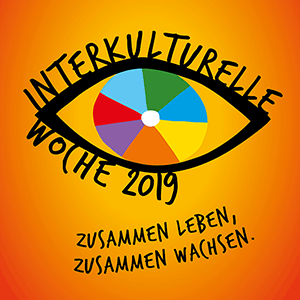WHY THE INTERCULTURAL WEEK?
The Intercultural Week constitutes a framework for people from various social circles to meet and communicate with one another. Its message can be encapsulated in three notions: ‘Meeting’, ‘Participation’ and ‘Integration’. It is in times of growing political populism that the Intercultural Week sends a clear signal for loyal and fair cooperation. It is a suitable platform for introducing and enlivening the topics of migration policies. Discussions on equal terms with the interested parties can be properly organised there. One can discuss current political topics with decision-makers and show empathy through direct communication.

WHAT IS THE INTERCULTURAL WEEK?
As part of the Intercultural Week, approx. 5000 events are held every year in late September in over 500 cities, towns and municipalities. The Refugee Day is part of the Intercultural Week. This week is an initiative of the German Bishops' Conference (DBK), Evangelical Church in Germany (EKD) and the Orthodox Church of Greece. Since 1975, it has been supported by churches, communes, charities, trade unions, integration councils and their representatives, migration organisations, religious communities and local initiative groups.
HOW IS THE INTERCULTURAL WEEK ORGANISED ON SITE?
The range of events includes small campaigns, exhibitions, workshops, theatre performances, musical and cabaret soirées, as well as political debates. Thanks to the participation of those involved, the Intercultural Week can be intentionally used to tackle political topics, e.g. in public discussions with local politicians, during film presentations and conversations with the audience directly after the film, or in other forms.
INTERCULTURAL WEEK MATERIALS
The Churches' Joint Message is printed in the materials booklet. Every year, it expresses the Churches' position on the multicultural society and on the purposes of the existence of a society based upon the principles of humanitarianism and human rights – and with regard to the current political situation. The booklet brings up important migration policy topics and is a guide to authors who are willing to participate in events of the Intercultural Week events. In addition, it contains interesting examples of practical activities and suggestions for organising such events. It is published by the Ecumenical Preparatory Committee (ÖVA), enabling cooperation between representatives of the Churches and civil society organisations. Together with the Refugee Day booklet, published by PRO ASYL, the package constitutes a solid basis for many important topics. The booklets, posters and postcards, which can be used for preparing the Intercultural Week on site, can all be ordered from mid-May on.
WHAT ELSE?
● Homepage: www.interkulturellewoche.de. This is where communication takes place on a national level through the events database with regard to what is occurring in a given place. This makes initiatives visible and combinable. Furthermore, it contains the comprehensive Good Practices Collection, from which one can get any number of ideas on event forms, which can be organised without great effort.
● Systematically updated tips and topics with regard to the Intercultural Week on Facebook.
● Facebook group, in which local organisers can communicate with one another, as well as with the committee`s office.
● Newsletter: available for order on the homepage and published four times a year.
● Committee’s office: those involved can seek advice on what kind of an event format to adopt, and on whether any structures they could merge with are already present on site.
Date 2019:
Intercultural Week/Interkulturelle Woche: Sunday, 22 September - Sunday, 29 September
Day of the Refugee/Tag des Flüchtlings: Friday, 27 September
Date 2020:
Intercultural Week/Interkulturelle Woche: Sunday, 27 September - Sunday, 4 October
Day of the Refugee/Tag des Flüchtlings: Friday, 2 October
More information about the dates (in German)